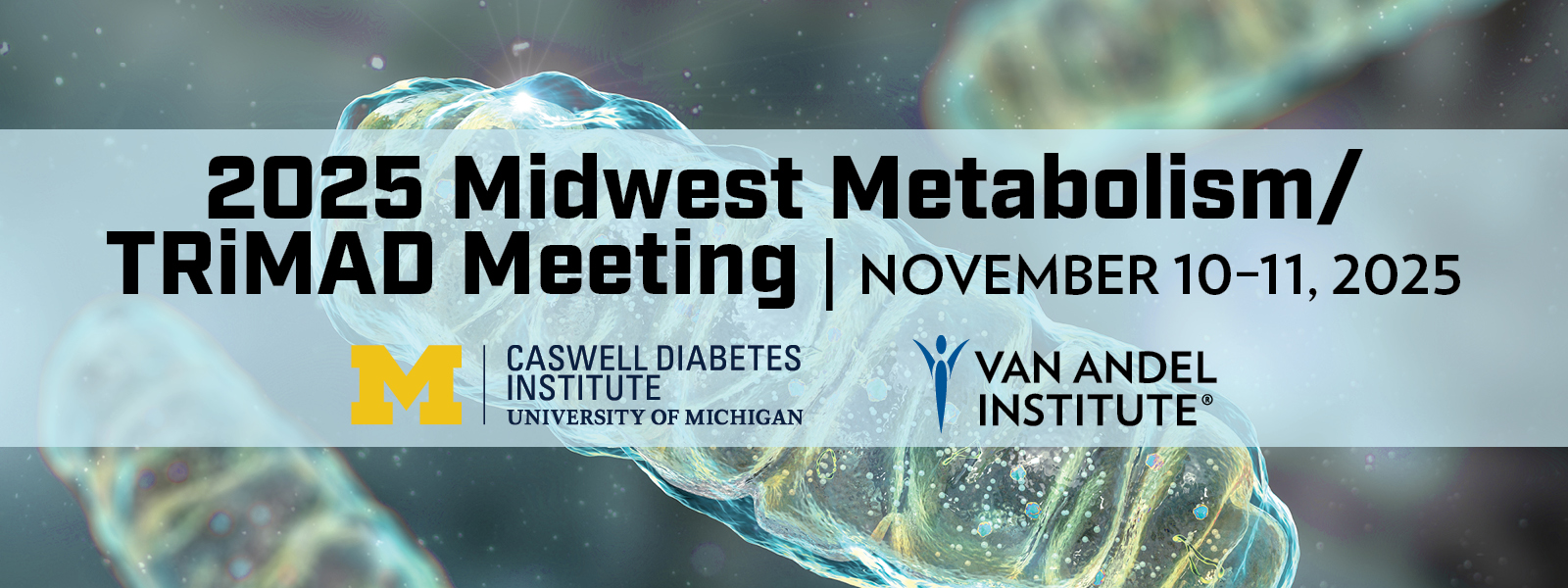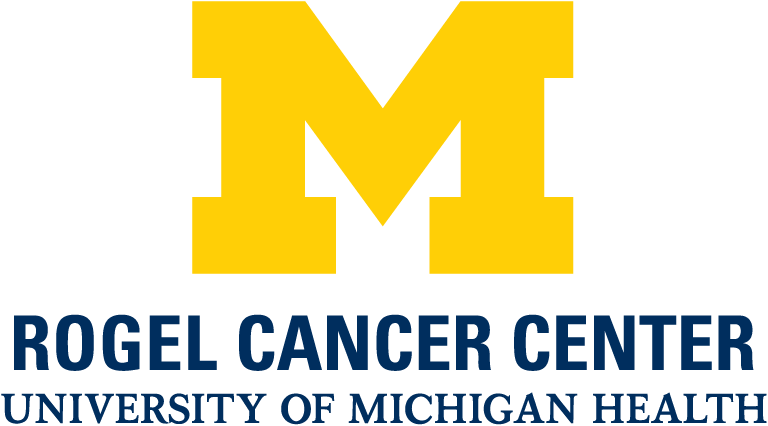2025 Midwest Metabolism Meeting

Thank you for your interest in the 2025 Midwest Metabolism/TRiMAD Meeting! Registration is closed as the event is at capacity.
We are thrilled to announce that the 2025 Midwest Metabolism Meeting is breaking new ground by partnering with the Translational Research in Mitochondrial Metabolism in Aging and Disease (TRiMAD) Annual Conference! This year’s combined event will take place at the University of Michigan, with co-sponsorship by Van Andel Institute, bringing together an even broader network of innovative minds in metabolism and metabolic disease research.
This two-day meeting will merge concepts that make each meeting great, including excellent regional speakers, abstract selected talks and a focus on trainee speakers. The Midwest Metabolism Meeting has a growing reputation as a regional metabolism conference, serving as a platform for trainees to exchange ideas with mentor faculty to accelerate advancements. The TRiMAD Conference is a pillar for the mitochondria, aging and metabolism research community on the east coast, offering a collaborative environment to share early-stage findings, foster new partnerships and inspire impactful science. This year’s expanded format combines the best of both conferences, creating a great opportunity to engage with colleagues from the upper Midwest and the Northeast.
Whether you are showcasing your latest work, searching for collaborators or staying updated on cutting-edge mitochondrial, aging, or metabolic research, you won’t want to miss this event.

Vincent Massey Collegiate Professor of Biological Chemistry, University of Michigan Medical School
Ruma Banerjee’s research focuses on the structural enzymology of human B12 trafficking proteins and the chemical biology of hydrogen sulfide signaling and homeostasis with a focus on the three-way interaction between diet, microbial and host energy metabolism. Her contributions have been recognized by her election to the American Academy of Arts and Sciences, the Merck (from the ASBMB) and the Pfizer (from the ACS) awards. She is a fellow of the ASBMB and the American Association for the Advancement of Sciences. She was the founding Director of the NIH-funded Redox Biology Center and has trained >100 students and postdoctoral fellows. She is deeply committed to mentoring and is the founding co-Director of ASBMB’s NIH-funded MOSAIC program. She currently serves on the editorial board on Biochemistry and Trends in Chemistry and was an associate editor for >10 years for Chemical Reviews and the Journal of Biological Chemistry.
Raphael Rubin Professor
Founding Director, MitoCare Center for Mitochondrial Imaging Research and Diagnostics
Department of Pathology and Genomic Medicine
Thomas Jefferson University
My group was among the first to visualize mitochondrial energy and ion metabolism in single live cells, and has studied the interaction of mitochondria with other organelles and initiated or contributed to the development of several novel concepts in mitochondrial biology. We are credited with the discovery of physically tethered contact sites between endoplasmic reticulum (ER) and mitochondria. This finding has been expanded to a paradigm of local communication, which has been implicated in many different diseases. Furthermore, my group showed that the ER-mitochondrial “synapses” enable calcium signal propagation to the mitochondria to control both energy production and cell death dependent on the quantity of calcium transferred and the coincident presence of stress factors. This finding was central to recognizing that mitochondria, like no other structures, are intimately and simultaneously linked to both energy of youth and the decline of the old. Our recent studies uncovered the molecular mechanism that allows mitochondria to decode different calcium signals, the impairment of which seems to be the cause of at least some mitochondrial diseases. In addition, we provided key pieces to the current understanding of mitochondrial maintenance and proper distribution by fusion and movements of mitochondria. Altogether, these discoveries contributed to the transformation of how we view mitochondria: that mitochondria can’t be seen as simple powerplants of our body but rather as hubs of signaling and dynamics. For these studies, we invented numerous microscopy techniques and probes which have been distributed to several hundred research groups worldwide.
Associate Professor, Department of Metabolism and Nutritional Programming, Van Andel Institute
Connie Krawczyk, Ph.D., is an associate professor at Van Andel Institute and a leader in investigating the links between metabolism, epigenetics and the immune system, with the goal of understanding how they work together in health and disease.
She earned her B.S. with honors in molecular biology and genetics from University of Guelph followed by her Ph.D. in cell and molecular biology from University of Toronto. She then completed postdoctoral fellowships in the labs of Dr. Hao Shen and Dr. Edward Pearce at University of Pennsylvania before taking a position as a senior research biologist at Merck Frosst. In 2011, Dr. Krawczyk was recruited to McGill University as an assistant professor, where her work focused on the molecular mechanisms regulating immune function and the immune system’s role in cancer development. She joined VAI as an associate professor in 2018 as part of its new Metabolic and Nutritional Programming group. She is an active member of several professional societies, including the Society for Leucocyte Biology, the immunoTherapy NeTwork (iTNT) and the Canadian Society for Immunology, and has served as a reviewer for the journals Cell Reports, Cell Metabolism, EMBO Reports, Immunity and Nature Scientific Reports, among others.
Associate Professor, Northwestern University
Laura Lackner is interested in the fundamental biological question of how spatial and dynamic organization within cells is achieved. As a model for intracellular organization, she studies the mechanisms that position mitochondria. Laura received her B.S. in Life Science Chemistry from John Carroll University and her Ph.D. in Molecular Biology from Case Western Reserve University, where she worked with Piet de Boer on the mechanism of division site selection in E. coli. She went on to do her postdoctoral work with Jodi Nunnari at UC Davis. In Jodi’s lab, she studied the mechanisms of mitochondrial division and positioning. She started at Northwestern University in 2013, where her lab is working to understand fundamental mechanisms used by cells to position mitochondria as well as form and regulate interorganelle contacts.
Assistant Professor, Biochemistry & Molecular Biophysics, Washington University in St. Louis
Natalie Niemi is an Assistant Professor of Biochemistry & Molecular Biophysics at Washington University School of Medicine in St. Louis. Her lab is broadly interested in understanding the molecular mechanisms underlying mitochondrial biogenesis, regulation, and turnover. In particular, the lab has a longstanding interest in the function of mitochondrial phosphatases (and, increasingly, kinases) and how these influence organellar homeostasis. In addition to her scientific interests, Dr. Niemi is invested in mentorship and has published multiple articles on improving academic mentoring for trainees and faculty.
Hugo F. and Ina C. Distinguished Professor
BJC Investigator
Howard Hughes Medical Institute/Washington University School of Medicine in St. Louis
Dave Pagliarini is the Hugo F. and Ina C. Distinguished Professor and BJC Investigator at Washington University School of Medicine. Prior to moving to St. Louis, Dave was the Lead Investigator and Arthur C. Nielsen Jr. Chair of Metabolism at the Morgridge Institute for Research and a Professor of Biochemistry at the University of Wisconsin-Madison. After graduating with honors in from the University of Notre Dame, Dave received a Ph.D. in biochemistry under the direction of Jack Dixon at UC San Diego and performed his postdoctoral research with Vamsi Mootha at Harvard Medical School/The Broad Institute. At WashU, Dave leads an interdisciplinary team of scientists focusing on a range of leading-edge challenges in mitochondrial biochemistry and metabolism. In particular, Dave’s lab blends large-scale systems approaches with mechanistic biochemistry to define the molecular underpinnings of mitochondria dysfunction in human disease. Dave has received a number of honors for his work, including a Searle Scholar Award, the Presidential Early Career Award for Scientists and Engineers (PECASE), the Young Investigator award from the Protein Society, and the Earl and Thressa Stadtman Young Scholar Award from the ASBMB. In 2024, Dave became an Investigator of the Howard Hughes Medical Institute. He lives in St. Louis with his wife, Carrie, and their two sons.
Coleman Foundation Associate Professor of Cancer Biology, University of Notre Dame
Zachary T. Schafer is the Coleman Foundation Associate Professor of Cancer Biology in the Department of Biological Sciences at the University of Notre Dame. His laboratory’s overarching goal to examine and characterize the biological mechanisms that permit cancer cell survival during tumor progression. More specifically, he has longstanding interests in understanding cell death processes induced by loss of integrin-mediated attachment to the extracellular matrix (ECM). This includes the discovery that ECM-detachment can compromise cell metabolism in a fashion that prohibits cell survival. In addition, his laboratory uncovered a link between RIPK1 and mitophagy during ECM-detachment, the mechanism by which SGK1 promotes metabolic reprogramming during ECM-detachment, and that ECM-detached cells are resistant to cell death caused by ferroptosis. Dr. Schafer’s research interests also encompass the role of intercellular communication between cancer cells and those present in the tumor microenvironment. This line of investigation centers on how metabolic changes in tumor cells impact reciprocal cross talk between cancer cells and fibroblasts or immune cells.
Dr. Schafer received his B.S. in Biological Sciences from Notre Dame in 2001. In 2006, he received his Ph.D. in Molecular Cancer Biology from Duke University under the direction of Dr. Sally Kornbluth. He then joined Dr. Joan Brugge’s laboratory in the Department of Cell Biology at Harvard Medical School as a postdoctoral fellow. In 2009, Dr. Schafer returned to the Department of Biological Sciences at Notre Dame as an Assistant Professor. In 2015, he was promoted to Associate Professor with Tenure. From 2019-2022, he served as the Assistant Department Chair in the Department of Biological Sciences. Dr. Schafer is currently appointed as the co-chair of the Metastasis & Microenvironment Peer Review Committee of the American Cancer Society and regularly serves as a grant reviewer for the National Institutes of Health and Department of Defense Breast Cancer Research Program. He is also an Associate Editor for the journal Breast Cancer Research. Dr. Schafer is the recipient of a V Scholar Award from the V Foundation for Cancer Research, a Career Catalyst Research Award from Susan G. Komen, and a Research Scholar Award from the American Cancer Society.
University of Michigan
Chair and Professor, Department of Metabolism and Nutritional Programming, Van Andel Institute
Dr. Russell Jones is a leading expert in the study of cancer metabolism and immunology. As professor and program lead of the Metabolic and Nutritional Programming group at Van Andel Research Institute, his work seeks to uncover how cancer cells fuel themselves through metabolic interactions, with the ultimate goal of developing new cancer therapeutics.
He earned his B.Sc. with honors in Biochemistry and his Ph.D. in Medical Biophysics from the University of Toronto, where he studied in the lab of Dr. Pamela S. Ohashi. After completing a postdoctoral fellowship in the lab of Dr. Craig B. Thompson at University of Pennsylvania in 2008, he accepted a position as an assistant professor in the Department of Physiology and Goodman Cancer Research Centre at McGill University. He was subsequently promoted to associate professor in 2014 and, in 2017, also took on the role of director of the Metabolomics Core Facility at Goodman Cancer Research Centre. He joined Van Andel Research Institute’s Center for Cancer and Cell Biology in 2018 as program lead and a founding member of its Metabolic and Nutritional Programming group. Dr. Jones has earned numerous accolades throughout his career, including a New Investigator Award from the Canadian Institutes of Health Research, the Bernard and Francine Dorval Prize from the Canadian Cancer Society, and several teaching awards at McGill University. He was named a William Dawson Scholar in 2014 and elected to the College of New Scholars, Artists and Scientists of the Royal Society of Canada in 2015. He also serves as a reviewer for a number of journals, including Cell Metabolism, Immunity, Nature, Nature Immunology and Science.
University of Pittsburgh
University of Michigan
Assistant Professor, Department of Metabolism and Nutritional Programming, Van Andel Institute
Dr. Sara Nowinski is an expert in mitochondrial biology and metabolism. She earned her Ph.D. in pharmaceutical sciences from the University of Texas at Austin, where she investigated the role of mitochondrial respiration and cancer metabolism. In 2014, she accepted a postdoctoral fellowship in the lab of Dr. Jared P. Rutter at University of Utah School of Medicine. While there, she developed and led a project that explored mitochondrial fatty acid synthesis (mtFAS) and metabolism. Her research revealed groundbreaking new insights into the significance of the mtFAS system, and reignited interest in studying this critical pathway. In 2021, she joined Van Andel Institute’s Department of Metabolism and Nutritional Programming as an assistant professor.
Dr. Nowinski has earned numerous accolades for her scholarship, including prestigious postdoctoral fellowships from the American Cancer Society, the United Mitochondrial Disease Foundation and the Pharmaceutical Researchers and Manufacturers Association.
University of Michigan
University of Michigan
University of Michigan
Associate Professor of Radiation Oncology and Neurosurgery, University of Michigan
Dr. Wahl is a physician scientist and a tenured Associate Professor of Radiation Oncology and Neurosurgery at the University of Michigan. He obtained his M.D. and Ph.D. degrees in 2012 from the University of Michigan, where he studied chemical biology and immunometabolism under the mentorship of Drs. Gary Glick and Jamie Ferrara. He then underwent clinical training in radiation oncology and a postdoctoral fellowship studying brain tumor biology, metabolism and the DNA damage response under the mentorship of Dr. Theodore Lawrence. He now runs a research group that studies the mechanistic links between altered metabolism, DNA repair and treatment resistance in brain tumors. His research team has translated this laboratory work into clinical studies that measure metabolism in brain tumor patients using stable isotope tracing and inhibit it through therapeutic clinical trials. His work has been published in leading journals including the Journal of Clinical Oncology, Cancer Discovery, Nature Communications, Cancer Cell and others. His work has been funded by the NCI, the NINDS, the Damon Runyon Cancer Foundation, the Mark Foundation, the V Foundation, the Sontag Foundation and the Ben and Cathy Ivy Glioblastoma Foundation.
There is a room block at a discounted group rate for Midwest Metabolism/TRIMAD Meeting attendees at the DoubleTree by Hilton. Rooms can be reserved through our dedicated Hilton booking site:
Reserve your room hereBooking through this link ensures you receive the special conference rate. We recommend reserving your room early, as space is limited.
Event Details
Contact Info:
Email: Courtney Zirkle



